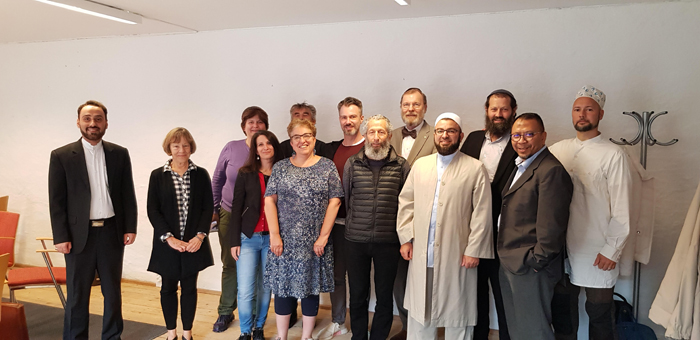Love, peace and justice represent the deepest values lying at the core of our religions; and Jews, Christians and Muslims all strive to do the good and the right as articulated by their spiritual traditions. Yet despite our common aspirations and our love for God and the religious traditions and ideas that we cherish, we all acknowledge that our traditions appear to justify forms of violence that seem strange or difficult for us to make sense of.
In a special program appended to the ICCJ International Conference held in Lund this year, more than a dozen participants and religious leaders in Malmö and other parts of Sweden joined the international scholars of the ICCJ's International Abrahamic Forum (IAF) for a day-long consultation on the ways in which our religious traditions justify violence. The program was hosted by Amanah, the Jewish-Muslim Trust and Faith Project in Malmö, Sweden, and consisted of a text-study colloquium at which attendees studied some of the scriptural texts within each of our traditions that have been understood to justify violence.
The day began with what was expected to be a brief period in which each participant would introduce themselves. However, their extraordinary and fascinating backgrounds and life-stories – along with our excitement at sharing common interests and different experiences - required an extra hour just so that we could get to know one another!
Texts prepared for our meeting included the biblical ruling in the Book of Numbers 35 allowing a blood avenger of a murder victim to kill the murderer, the command in Deuteronomy 20 to kill all inhabitants of an enemy city, the Qur’anic command to kill idolaters in Sura 9, the war verses in Sura 2, the verses in Matthew 10 in which Jesus declares that he came not to bring peace to the world but a sword, and his statement in Luke 19 in which he called to kill his enemies in his presence.
We did not manage to study them all, but for those we examined, our discussions ranged deep and wide, treating contextual issues and the reception history of these texts in our interpretive traditions. In all cases we became much more aware of how competing interpretations strive to control the meanings of scripture as they are taught and implemented in the lives of religious communities.
The entire day ended up as an extraordinary experience of shared fellowship, intellectual stimulation, and spiritual deepening.
 |
| Some of the participants (f.l.t.r.): Imam Morteza Rezazadeh (Iran), Prof. Heidi Hadsell (USA), Rabbi Ute Steyer (Sweden), Elena Dini (Italy), Rabbi Rebecca Lilian (Sweden), Prof. Frederek Musall (Germany), Prof. Reuven Firestone (USA), Rabbi Peter Borenstein (Sweden), Imam Salahudeen Barakat (Sweden), Rabbi Moshe David HaCohen (Sweden), Hannan M. Hassan (Singapore), Andreas Hasslert (Sweden) |
The IAF seeks to engage local communities in educational programming in conjunction with ICCJ Annual Conferences. For more information, contact us at iaf@iccj.org.
